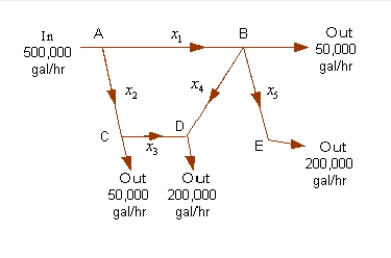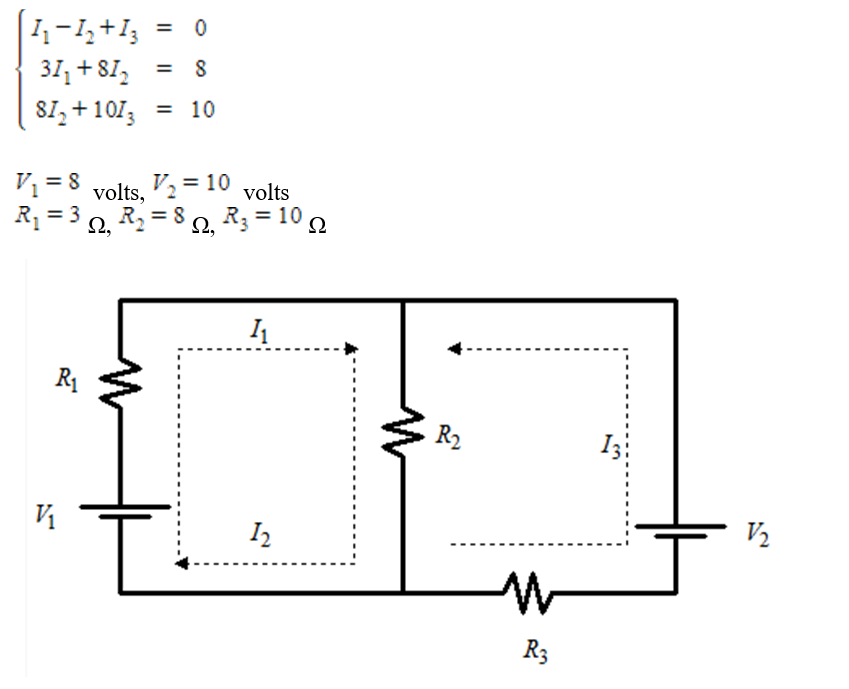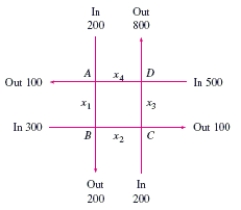Exam 1: Linear Equations
Exam 1: Linear Equations25 Questions
Exam 2: Matrices48 Questions
Exam 3: Determinants47 Questions
Exam 4: Vector Spaces100 Questions
Exam 5: Inner Product Spaces54 Questions
Exam 6: Linear Transformations46 Questions
Exam 7: Eigenvalues Eigenvectors32 Questions
Select questions type
Write the system of linear equations represented by the augmented matrix. Then use back-substitution to solve. (Use variables x, y, and z.) 
Free
(Multiple Choice)
4.7/5  (38)
(38)
Correct Answer:
A
Find the solution set of the system of linear equations in the variables x and y (in that order) that has the following augmented matrix. 
Free
(Multiple Choice)
4.7/5  (27)
(27)
Correct Answer:
B
Find the equation of the parabola  that passes through the points
that passes through the points  .
.
(Multiple Choice)
4.7/5  (39)
(39)
Use back-substitution to solve the system of linear equations. 
(Multiple Choice)
4.8/5  (33)
(33)
Irrigation. An irrigation system allows water to flow in the pattern shown in the figure below. Water flows into the system at A and exits at B, C, D, and E with the amounts shown. Using the fact that at each point the water entering equals the water leaving, formulate an equation for water flow at each of the five points and solve the system.

(Multiple Choice)
4.9/5  (36)
(36)
Suppose that the U. S. population for the years 1920, 1930, 1940, and 1950 is shown in the table below. Let x represent the number of decades since 1920. Find a cubic polynomial  that fits these data
that fits these data 
(Multiple Choice)
4.9/5  (29)
(29)
Use Gaussian elimination method to solve the system of linear equations. 
(Multiple Choice)
4.9/5  (37)
(37)
Applying Kirchhoff's Laws to the electrical network in the figure, the currents I1, I2, and I3 are the solution of the system

(Multiple Choice)
4.7/5  (36)
(36)
Solve the following system using either Gaussian elimination with back-substitution or Gauss-Jordan elimination. If there is no solution, state that the system is inconsistent. 
(Multiple Choice)
4.8/5  (39)
(39)
Traffic flow. In the analysis of traffic flow, a certain city estimates the following situation for the "square" of its downtown district. In the following figure, the arrows indicate the flow of traffic. If x1 represents the number of cars traveling between intersections A and B, x2 represents the number of cars traveling between B and C, x3 the number between C and D, and x4 the number between D and A, we can formulate equations based on the principle that the number of vehicles entering an intersection equals the number leaving it. That is, for intersection A we obtain
 Formulate equations for the traffic at B, C, and D. Solve the system of these four equations.
Formulate equations for the traffic at B, C, and D. Solve the system of these four equations.

(Multiple Choice)
4.8/5  (28)
(28)
The given matrix is an augmented matrix representing a system of linear equations. Find the solution of the system. 
(Multiple Choice)
4.7/5  (27)
(27)
Suppose that the U. S. population for the years 1920, 1930, 1940, and 1950 is shown in the table below. Let x represent the number of decades since 1920. Estimate the population in 1970 by using a cubic polynomial that fits these data. 
(Multiple Choice)
4.8/5  (27)
(27)
Suppose that the net profit (in millions of dollars) for Microsoft from 2000 to 2007 is shown in the table below. 
 A cubic model that matches the data for the years 2001, 2003, 2005, and 2007 is to be determined where x represents the number of years since 2000. Set up a system of equations to solve for the coefficients a0, a1, a2 and a3.
A cubic model that matches the data for the years 2001, 2003, 2005, and 2007 is to be determined where x represents the number of years since 2000. Set up a system of equations to solve for the coefficients a0, a1, a2 and a3.
(Multiple Choice)
4.7/5  (31)
(31)
Use a system of equations to write the partial fraction decomposition of the rational expression  .
Then solve the system using matrices.
.
Then solve the system using matrices.
(Multiple Choice)
4.8/5  (36)
(36)
Showing 1 - 20 of 25
Filters
- Essay(0)
- Multiple Choice(0)
- Short Answer(0)
- True False(0)
- Matching(0)